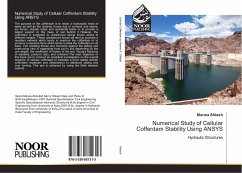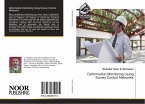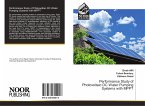The purpose of the cofferdam is to retain a hydrostatic head of water as well as the dynamic forces due to currents and waves, ice forces, seismic loads and accidental loads or to provide a lateral support to the mass of soil behind it. However, the cofferdam is subjected to unbalanced lateral forces acting at different heights. These unbalanced forces will tend to produce a resultant moment which tends to overturn the cofferdam or to produce a resultant force which tends to slide the cofferdam on its base. The resisting forces and moments against the sliding and overturning vary in magnitude from soil to soil depending on the unit weight, the coefficient of friction of the soil, Young's Modulus of elasticity, poison's ratio, and cohesion.The main objective of this book are to conduct an analytical investigation on the overall behavior of cellular cofferdam to estimate a more stable cellular cofferdam (materials and dimensions) to withstand sliding and over turning. This aim is achieved by using the finite element method.
Bitte wählen Sie Ihr Anliegen aus.
Rechnungen
Retourenschein anfordern
Bestellstatus
Storno








